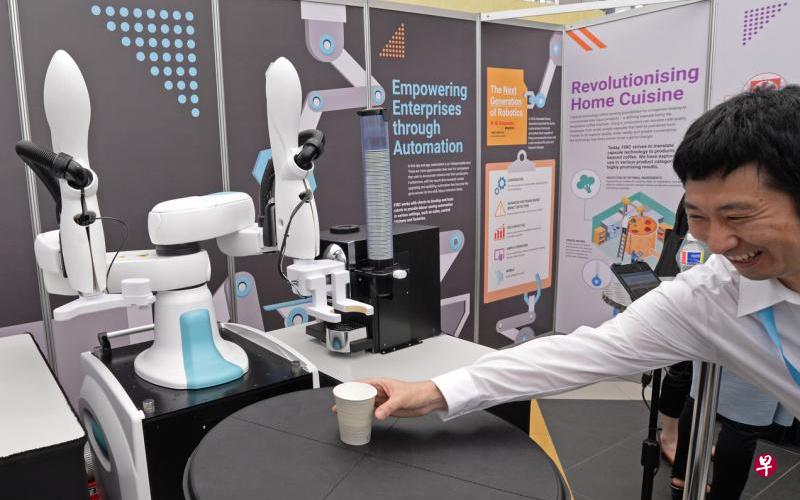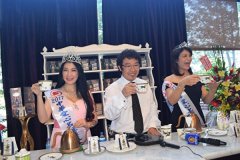And this kind of operation! Singapore develops "capsule food" chicken soup which can be brewed with coffee machine.

For professional baristas, please follow the coffee workshop (Wechat official account cafe_style)
The Food Innovation and Resource Center of the Singapore Institute of Technology began to study the capsule food last year, and so far there are six kinds of food, such as ginseng chicken soup, satay sauce and nut milk for people with lactose intolerance.
Locally developed "capsule food", you only need to put the concentrated capsule into the capsule coffee machine at home, and you can brew a bowl of hot medicinal soup or satay sauce in just a few minutes.
To commemorate its 10th anniversary, the Food Innovation and Resource Center of Singapore Institute of Technology began to study this kind of capsule food (capsule food) last year. So far, there are six kinds of food, such as ginseng chicken soup, satay sauce, Thai green curry and nut milk for people with lactose intolerance.
Dr. Li Minhui, senior manager of the center, pointed out in an interview that it usually takes several hours to cook soup or make sauces, but capsule food can be brewed in the home's capsule coffee machine and can be enjoyed within a few minutes, greatly reducing the time spent preparing food.
She also said that capsule food has a longer and stable shelf life and can be stored for up to three to six months, depending on the ingredients.
In addition to capsule food, other future food concepts on display yesterday include halal meat and bone tea made from chicken, which can be purchased from vending machines, and food that can be adjusted according to individual needs and then printed through a three-dimensional printer.
In addition, the Centre signed a Memorandum of Cooperation (MOU) with Japanese consultant ICMG yesterday to set up a food innovation platform for Japanese and local food companies to conceive, test and commercialize food innovation, packaging and automation.
Under the MOU, the Centre also designed an advanced workshop with ICMG called "Japanese Food Innovation Series" (masterclass), which mainly helps food companies participating in the course to better understand Japanese food culture and product manufacturing, develop high-quality healthy foods and extend their shelf life without the use of chemicals. The series is divided into four courses and will begin next month.
Dr Li Minhui pointed out that at present, seven Japanese companies, such as miso manufacturer Marukome and snack and ice cream manufacturer Ezaki Glico, have participated in the course. They are also willing to conduct one-on-one on-site visits with local food companies to provide professional advice.
Shen Ying, senior minister of government of the Ministry of Trade and Industry and Ministry of Culture, Community and Youth, witnessed the signing ceremony yesterday. "through the cooperation memorandum, the two sides will be able to promote cooperation between Singaporean and Japanese enterprises in the field of food science and technology, and formulate mutually beneficial plans to enhance technical expertise and knowledge exchange," she said.
The Food Innovation and Resource Center, established in 2007, uses science and technology to develop new products or add value to products. It also recommends enterprises to adopt appropriate packaging, improve work processes and extend product shelf life to enhance the international competitiveness of small and medium-sized enterprises.
To date, the Centre has assisted more than 620 companies to participate in more than 1000 cooperative projects, of which more than 40% have been adopted and successfully commercialized.
Important Notice :
前街咖啡 FrontStreet Coffee has moved to new addredd:
FrontStreet Coffee Address: 315,Donghua East Road,GuangZhou
Tel:020 38364473
- Prev

Youth invincible is to MAX Ximenting flash dance to taste the coffee.
Exchange of professional baristas Please follow the Coffee Workshop (Wechat official account cafe_style) ▲ under the auspices of Maxwell Coffee, Ximenting, which has always been full of youth, held a pop-up event featuring showgirl dance and cosplay parade on the afternoon of the weekend. On the afternoon of the weekend, Ximenting, which has always been full of youthful vitality, held a showgirl dance and cosplay tour.
- Next

99 Chongyang respect for the elderly filter vertical coffee bazaar
Professional barista exchange please pay attention to the coffee workshop (Wechat official account cafe_style) Double-ninth Day is coming, research and development of filter vertical hand coffee with the world patent 181 International Co., Ltd., on the 27th in Bao Wanglai 6 Garden Hotel held a bazaar, the scene poured into a large number of people, in addition to getting a series of coffee gift boxes, you can also participate in the filter vertical hand coffee competition to share with teaching, when
Related
- Workers collapse! Lucky suspects that it will introduce freshly cut fruits?!
- 1-point subsidy recipients wear thousand-yuan watches?! Local response: For low-income households
- Can lightly roasted coffee beans be used to extract espresso? How finely should you grind high-quality coffee beans to make Italian latte?
- What is the difference between the world's top rose summer coffee and Yejia Shefi? What are the flavor characteristics of Yega Shefi coffee and Panama rose summer?
- The ceremony is full! Starbucks starts to cut the ribbon at a complimentary coffee station?!
- A whole Michelin meal?! Lucky launches the new "Small Butter Apple Crispy Latte"
- Three tips for adjusting espresso on rainy days! Quickly find the right water temperature, powder, and grinding ratio for espresso!
- How much hot water does it take to brew hanging ear coffee? How does it taste best? Can hot water from the water dispenser be used to make ear drip coffee?
- What grade does Jamaica Blue Mountain No. 1 coffee belong to and how to drink it better? What is the highest grade of Blue Mountain coffee for coffee aristocrats?
- What are the flavor characteristics of the world-famous coffee Blue Mountain No. 1 Golden Mantelin? What are the characteristics of deep-roasted bitter coffee?

